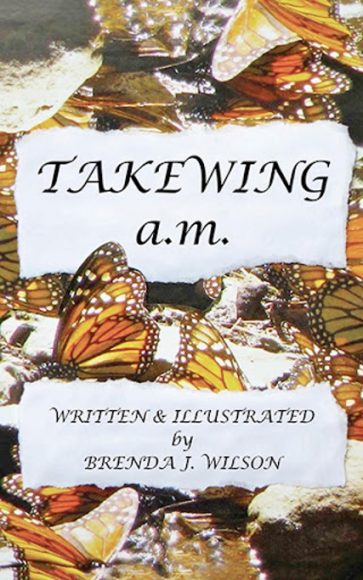TAKEWING a.m., written and Illustrated by Brenda J. Wilson. FriesenPress, 348 pages
TAKEWING a.m. is Brenda J. Wilson’s first novel, although she has a long track record as a media producer, librarian, photographer and educator. She also wears many hats, often times simultaneously, as she likes to tell anybody who is willing to listen to stories of her trips to the Monarch Butterfly Biosphere Reserve in Michoacán, Central Mexico, over the course of more than thirty years.
Butterflies are her passion, which is why the subject of this unique and original novel is the yearly migration of the monarch butterfly from Canada to Mexico and then back to Canada. It is a 3,000-mile trip that requires a lot of energy and determination for a creature that only weighs half a gram! Historically, these apparently fragile creatures have been making the journey with relatively few losses. Of late, however, climate change, extreme weather conditions, pesticides and other anthropogenic disasters have taken their toll.
The novel documents this incredible journey, which has been the subject of multilateral agreements between governments to study the butterfly’s migration patterns. It also peeps into the lives of a number of people who also migrate back and forth between Canada and Mexico, generally flying by plane and not on their own wings.
This amazing migration is also lovingly studied by a whole army of academic researchers, “citizen scientists,” students, children and other nature lovers. The yearly migration of the monarch butterfly is the thread that holds together a patchwork of human stories that document scientific research, love affairs, heinous crimes, Indigenous celebrations, culinary traditions and the beauty of natural landscapes in both countries. This book is billed as a novel, but it can also be read as a cautionary tale of how human depredation is contributing to climate change.
The fictional part of the book tells the story of a Mexican boy and a Mexican girl who fall in love with a Canadian girl and a Canadian boy, respectively. The Mexican protagonists are bound together by blood ties whereas the Canadian ones are bound together by their environmental concerns. There is also a subplot involving environmental crimes committed by a well-known transnational corporation, spousal abuse, secret government operations and the misuse of military tracking equipment for personal purposes.
At first, the reader wonders why the author has introduced these apparently extraneous elements into the storyline, but it then becomes clear that they are all connected to the way the monarch butterfly’s journey is tracked over Canadian, U.S. and Mexican territory. This subplot takes place in Canada. On the Mexican side, corruption is not so subtle and is apparent in illegal logging operations and the outright murder of environmentalists. Considering that this book is set in 2011 and was presumably researched several years before, the author is spot on in foreshadowing today’s level of violence pitting organized crime against conservationists.
Brenda J. Wilson writes in a clear and straightforward style, with few or no embellishments. But who needs flowery language when the serene beauty of the Canadian countryside in winter speaks for itself? Moreover, with the burst of colour and the explosion of vibrant music unleashed when tens of thousands of monarch butterflies warmed by the sun unfurl their wings and take off on their journey back to Canada, adjectives would pale in comparison.
When you read TAKEWING a.m., don’t allow yourself to be overcome by sadness and despair. If this dainty creature can undertake this perilous journey year after year, we can certainly make sure it reaches its destination safely. The monarch butterfly teaches us that hope and determination can get us to our destination.









